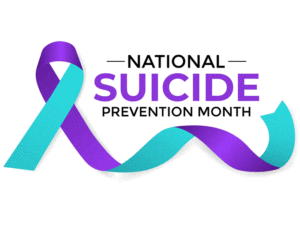As Suicide Prevention Month comes to a close, it’s important that we continue to keep the health and wellbeing of our friends, families, coworkers, and ourselves in mind. All too often, correctional health and custody professionals put others first in their personal and professional lives. With a call to serve, that makes perfect sense and is in line with the honorable profession we have chosen. Couple that with a consistent focus on the importance of care and custody of those housed in our facilities and it’s easy to forget to take care of ourselves and each other.
While we all know that suicide is the leading cause of death for individuals held in jails and one of the most prevalent in our prisons, we sometimes forget about the increased risks for those working in our federal, state, and local correctional systems.
Medical and custody staff face many of the same stressors while on the job.
- Aggression from people in custody
- Violence and potential to be taken hostage
- Perceiving danger and exposure to biohazards
- Fear of making a life-changing mistake
- Suicide attempts and threats of suicide
In addition, medical and custody professionals face the same personal risk factors.
- Medical or mental illness
- Prolonged stress
- Substance use
- History of trauma or abuse
- Tragedy or recent loss
- Reluctance to seek help
There are several warning signs and behaviors that we can look for in ourselves and others.
- Mood swings and impulsive behavior
- Changes in work performance
- Withdrawal from friends or family
- Increased substance use or abuse
- Giving away possessions or saying goodbye
- Tying up loose ends or buying a weapon
In my travels throughout the United States, it’s abundantly clear that there is no city, state or region that is immune from the tragedy of suicide. So, what can we do to reduce the risk of suicide for ourselves, our coworkers, and all those important to us?
We can focus our efforts on situational awareness at all levels. For medical and custody professionals, that may be paying attention to your own feelings and actions and those of the people around you. We are trained to monitor the patient or the person in custody, but how much effort are we placing on how to monitor our co-workers and ourselves?
Medical and custody leaders at all levels, let’s dedicate more time and resources to communicating with others. Take a few moments to talk with your co-workers and check in. Talk a little about yourself and they will likely do the same. It’s not always about just the job; the people are what make our correctional facilities operate as safely and humanely as possible.
Life skills, social support, and work-life balance are not just words. We all have ups and downs in our lives and sometimes all it takes is a listening ear and a willingness to help that can save a life. Sometimes it takes more and that’s OK, help is available.
Urgent – Available 24/7
- Dial “988” – Suicide and Crisis Lifeline or online at https://chat.988lifeline.org
Web-based Resources
- American Foundation for Suicide Prevention (https://afsp.org)
- International Association for Suicide Prevention (https://iasp.info)
- National Alliance on Mental Illness (https://www.nami.org)
- Suicide Prevention Resource Center (https://sprc.org)
Let’s all do our best to take care of each other and remember that we are all valuable and important. Talk to someone if you need help and open up an ear to someone in need.
Life, liberty, and the pursuit of happiness…sounds good to me!
Thanks for everything you do, stay safe and healthy.
-Fred
Fred W. Meyer, MA, CJM, CCHP
Managing Director, NCCHC Resources, Inc.

